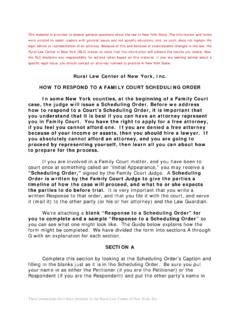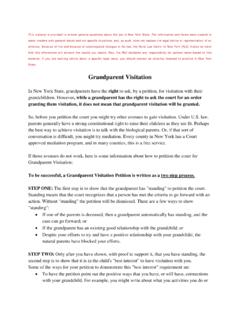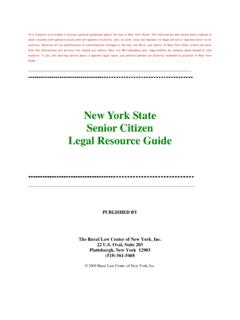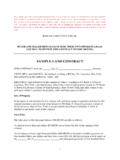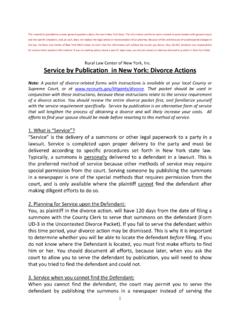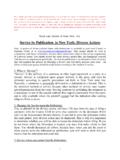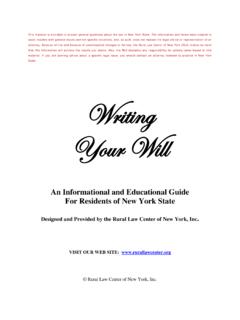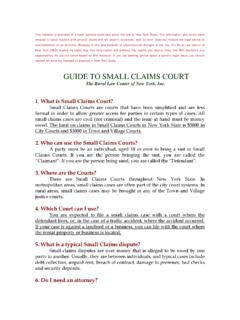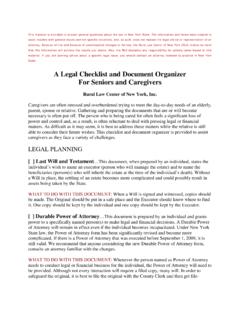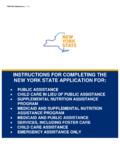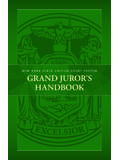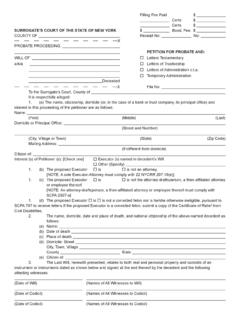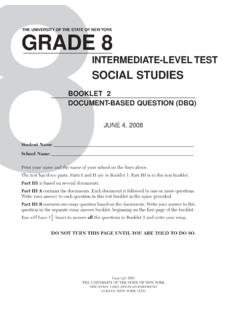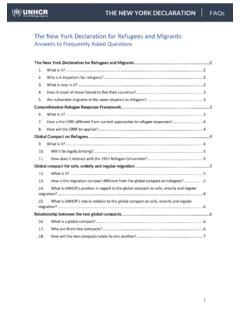Transcription of How to Prepare for a Child Custody Case in New York State
1 This material is provided to answer general questions about the law in New york State . The information and forms were created to assist readers with general issues and not specific situations, and, as such, does not replace the legal advice or representation of an attorney. Because of this and because of unanticipated changes in the law, the Rural Law Center of New york (RLC) makes no claim that this information will achieve the results you desire. Also, the RLC disclaims any responsibility for actions taken based on this material. If you are seeking advice about a specific legal issue, you should contact an attorney licensed to practice in New york State .
2 How to Prepare for a Child Custody case in New york State Published and provided by The Rural Law Center of New york , Inc. FACTORS TO BE CONSIDERED IN DETERMINING Custody OF A Child : The general test in determining Custody in a contest between parents, is the best interest and welfare of the Child . Court decisions set forth several factors which are to be considered in determining best interests. These factors are as follows: (1) The parent who has been the primary caretaker; (2) The need for stability and continuity in the Child s life; (3) The relative financial ability of each parent; (4) The quality of home environment and the parental guidance each parent provides; (5) The ability of each parent to provide for the Child s emotional and intellectual development; (6) The relative fitness of each parent; (7) The length of time the present custodial arrangement has been in effect; (8) The desires of the Child .
3 GUIDELINES FOR CLIENTS IN Custody AND VISITATION CASES We have found that the outcome of a Custody or visitation case depends, in large part, on the preparation which goes into it. In that regard, there are many things which you can do to aid in the preparation of your case . The following are areas where your preparation can be most helpful: 1) JOURNAL Your Custody or visitation journal is a daily record of events which impact your children s lives, and which reflect upon either parent s abilities as a caretaker for your children. This journal should be kept on a daily basis, both so that you do not forget important events and so that you are not later accused of erasing events which may or may not have occurred.
4 You should list both the routine and special events which take place on a given day. While routine items ( preparation of a meal) may not seem important at first, when viewed as part of a long-term pattern of care they take on great significance. Be as detailed as you like, for example your description of a meal s preparation might include a menu (to show that your children receive nutritional meals), as well as a description of the children s roles in setting the table, in fixing the salad or dessert, and in helping clear the table (to show that they are taught a sense of teamwork and responsibility).
5 Your journal should also include statements that the children make, or a description of matters which you and the children discuss. These do not need to be matters directly relating to the Custody and visitation issues. In most cases it is not helpful for you to provoke discussion in those areas, but may include your children s feelings about you or the other party, as well as their statements about day-to-day occurrences in their lives. It is very likely that the contents of your journal will be used in court should your case go to trial.
6 Oftentimes, it can be utilized to show your contemporaneous recording of events, or to refresh your recollection on the witness stand. Because of this, you must be careful what you write. Your journal is obviously not the place for you to chronicle your love life, or to apologize for any shortcomings you may feel you have as a parent. It should not contain any inappropriate language or comments. And, while it is to write about actual events or statements which put the other party in a bad light, be careful not to overdo it. The tone of your journal generally should be positive and a reflection on your good points.
7 It should not be solely a smear piece against the other party. Your journal is one of the most important devices available to assist in your case . For that reason, we encourage you to take the time to make and keep this record. 2) PHOTOGRAPHS/VIDEOS The old adage a picture is worth a thousand words often holds true in Custody and visitation matters. It is almost always the case that photographs can be used to illustrate some aspect of your care and ability to parent, whether it be to show the Court the physical setting (home, living and sleeping areas, nearby playgrounds, etc.
8 You provide your children, or the various events and activities which you enjoy with them. If you do not have a camera, get one. There are good, inexpensive, disposable cameras available most everywhere. Photograph your home and all its living areas, giving special attention to where the children eat, sleep and play. Take pictures of the yard, any nearby playgrounds or parks, and any other places ( grandparents house) where the children spend a substantial amount of their time. Photograph routine events in the children s lives (such as getting off the school bus, or saying bedtime prayers) in order to illustrate how their days are spent and your involvement on a daily basis.
9 Photograph special events, holidays, trips and vacations, and be sure to include your children s friends and extended family (grandparents, aunts and uncles, cousins) in photos of family gatherings. Do not forget to include yourself in many of these photos. If any bad things appear, such as your children having injuries or bruises you should (among other things) take a picture. You should also take steps to preserve any photographs or family albums you already have, so that a record of your past involvement in the children s lives can be shown to the Court.
10 Videos are another means to depict your involvement with the children. ONE WARNING: Since most video recordings also include sound, be careful that you are not heard directing your children about. Our purpose in proving your genuine love and care for your children may be undermined if you are perceived to have staged certain events. 3) AUDIO RECORDING An audio recording ( a tape recording) of statements or other events may prove helpful in certain circumstances. For example, if the other parent is often drunk, or chronically shouts at the children, a recording of his/her voice may help to prove it.
